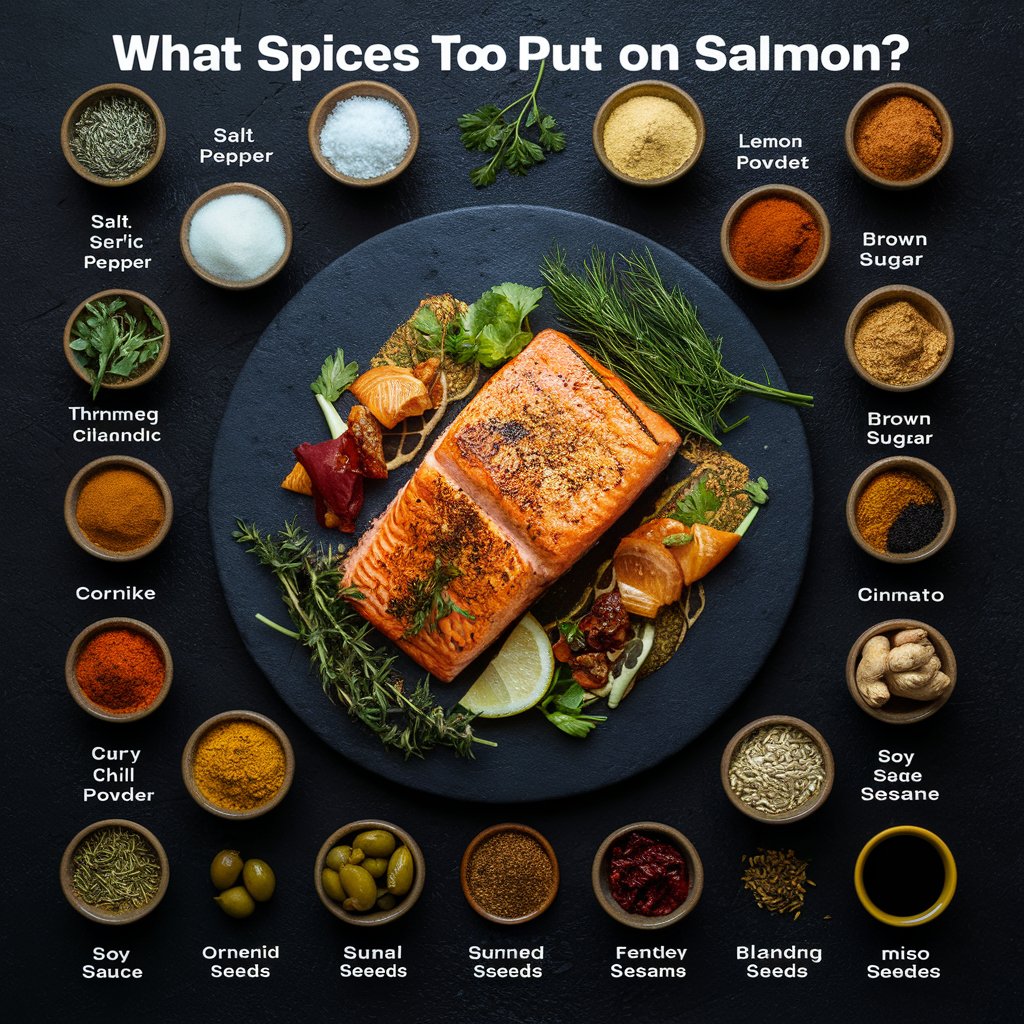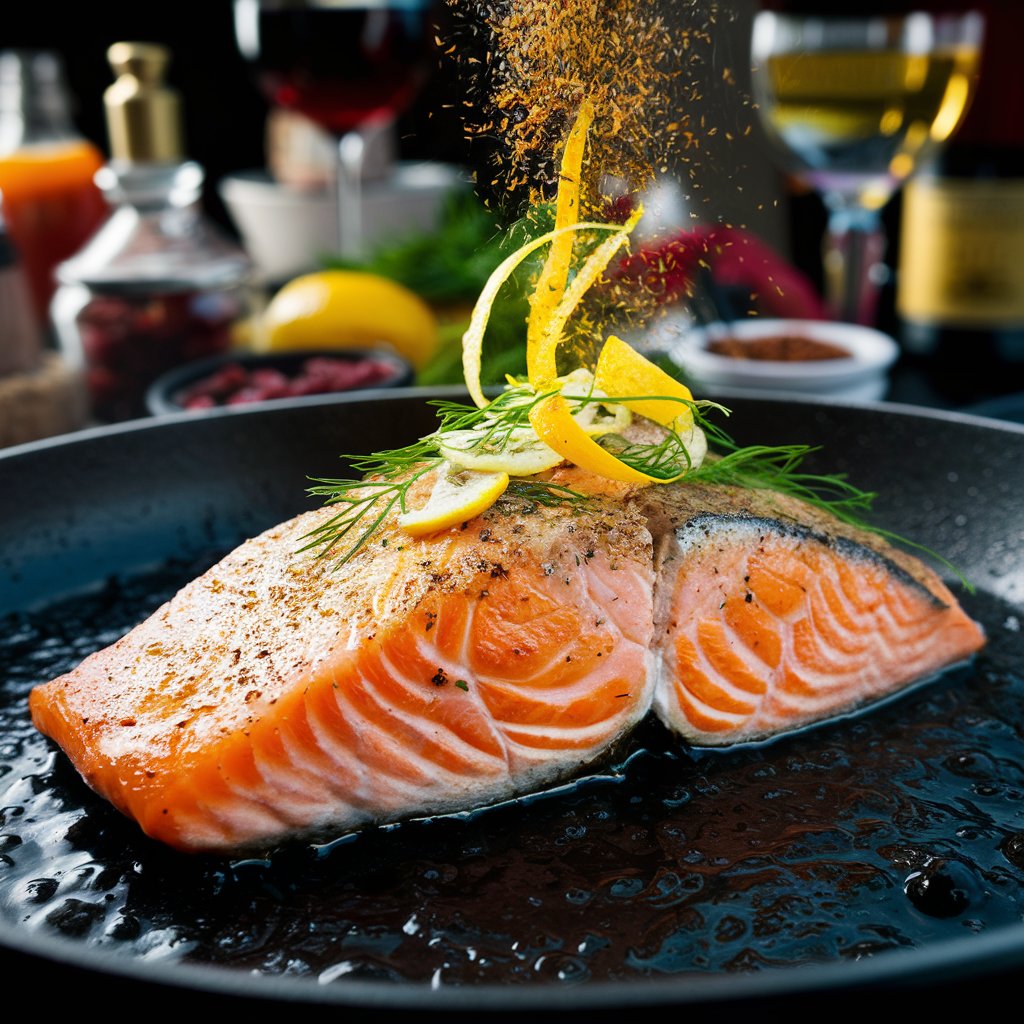Salmon is a star of the seafood world, prized for its rich, buttery texture and natural flavor. But what truly transforms this fish into a memorable meal? The answer lies in understanding how to season salmon. Whether grilling, baking, or pan-searing, mastering the art of seasoning enhances salmon’s taste, creating a culinary delight every time. By learning how to season salmon, you’ll bring out its best qualities and unlock endless flavor possibilities.

Why does seasoning salmon make a difference?
Knowing how to season salmon is the key to elevating a simple meal into something extraordinary. Without the right seasonings, even fresh salmon can taste flat. By mastering how to season salmon, you can enhance its natural richness and complement any cooking method, from smoky grill marks to a crispy seared crust.
Exploring salmon’s natural flavors
To effectively learn how to season salmon, you must first understand its flavor profile. Salmon’s mild yet rich taste, with a subtle hint of sweetness, serves as the perfect base for a variety of seasonings. From zesty citrus to earthy spices, knowing how to season salmon means embracing its versatility. This adaptability allows you to experiment with flavors inspired by global cuisines, whether you’re using Mediterranean herbs or bold Cajun spices.
How to strike the right balance
The key to mastering how to season salmon lies in achieving balance. You want to enhance its natural flavor, not overwhelm it. While bold spices like paprika or chili powder can create a statement, too much can overshadow salmon’s delicate sweetness. On the other hand, using too little seasoning may leave the dish bland. Understanding how to season salmon effectively ensures your dishes are both flavorful and harmonious, highlighting the salmon without masking its natural charm.
Basic Spices for Salmon: How to Season Salmon with Essentials
Sometimes, simplicity is best. A few basic ingredients can make salmon shine without overpowering its natural character. These essentials form the foundation of almost any salmon dish.
Salt and pepper: The go-to combo
Salt and pepper are the foundation of any guide on how to season salmon. These essential seasonings enhance the fish’s natural sweetness and create the perfect base for additional spices. When exploring how to season salmon, always start with high-quality sea salt and freshly ground black pepper.
Adding a citrusy twist with lemon
Lemon and salmon are a match made in culinary heaven. The bright, zesty flavor of lemon juice cuts through the fish’s richness, adding a refreshing contrast. Use freshly squeezed lemon juice before or after cooking, or zest the peel over the top for a more concentrated citrus aroma.
The magic of garlic powder
Garlic powder is a pantry staple that brings depth to any salmon dish. Its mild, savory flavor pairs perfectly with the fish’s natural sweetness, creating a well-rounded taste. Sprinkle it lightly over the fillet or combine it with salt, pepper, and olive oil for a quick rub before cooking.
Herbs That Work Wonders
Herbs are a game-changer when it comes to seasoning salmon. They bring fresh, aromatic notes that elevate the dish without overpowering it. Whether used fresh or dried, these herbs work wonderfully with salmon’s delicate flavor.
Dill: A timeless favorite
Dill is perhaps the most iconic herb for seasoning salmon. Its bright, grassy flavor enhances the fish’s natural sweetness while adding a slight tangy note. Sprinkle fresh dill over baked or roasted salmon, or mix it into a creamy dill sauce for a classic pairing.
Subtlety with parsley
Parsley is a mild herb that works well as a garnish or a seasoning. Its fresh, clean taste complements salmon without stealing the spotlight. Combine chopped parsley with lemon juice and olive oil for a quick topping, or use it to finish grilled salmon.
Thyme and rosemary for depth
For a more robust flavor, turn to thyme and rosemary. These earthy herbs are particularly suited for roasted or baked salmon. Thyme adds a subtle woodsy note, while rosemary brings a pine-like aroma that pairs beautifully with olive oil and garlic.
Cilantro for a Adding zest with cilantroZesty Twist
If you’re looking for something vibrant and slightly exotic, cilantro is a fantastic choice. Its bold, citrusy flavor adds a fresh twist to salmon, particularly in Asian or Latin-inspired dishes. Pair it with lime juice for a tangy marinade or chop it finely as a finishing touch.
Warm and Sweet Spice Combinations: A Guide to How to Season Salmon Creatively
The interplay of warm and sweet flavors can transform salmon into a unique culinary experience. These combinations add depth and richness to the fish, creating a perfect balance of savory and sweet.
Paprika: Smoky or Sweet
Paprika is a versatile spice that works wonders on salmon. Smoked paprika imparts a rich, earthy flavor with a hint of smokiness, ideal for grilled or baked preparations. On the other hand, sweet paprika provides a mild, slightly peppery taste. Sprinkle paprika generously over salmon before grilling or mix it with olive oil for a flavorful marinade.
Brown Sugar or Honey for Caramelization
A touch of brown sugar or honey can bring out salmon’s natural sweetness. These sweeteners caramelize beautifully during cooking, giving the fish a golden, slightly crisp crust. Combine brown sugar with chili powder for a sweet-and-spicy rub, or drizzle honey over baked salmon for a simple yet elegant dish.
Cinnamon or Nutmeg for a Hint of Warmth
While unusual, a pinch of cinnamon or nutmeg adds a cozy, aromatic twist to salmon. These warm spices pair well with sweet glazes or marinades, enhancing the overall flavor profile. Use sparingly to avoid overpowering the fish, and balance it with citrus or herbs for a harmonious finish.
Bold and Exotic Flavors: Exploring Unique Ways to Season Salmon
For those seeking adventurous flavor profiles, bold spices can add an exciting dimension to your salmon dishes.
Cumin and Coriander for an Earthy Touch
Cumin’s nutty, earthy flavor blends seamlessly with salmon’s richness. Pair it with coriander, which has a citrusy, floral note, for a balanced and complex seasoning. Use these spices in a dry rub or combine them with olive oil and lime juice for a bold marinade.
Curry Powder for an Exotic Flavor Profile
Curry powder is a blend of spices that can take your salmon to an exotic level. Its mix of turmeric, cumin, and coriander adds warmth and complexity. Marinate salmon in curry powder and yogurt for an Indian-inspired dish, or sprinkle it over fillets before roasting.
Chili Powder and Cayenne for a Spicy Kick
Add some heat to your salmon with chili powder or cayenne pepper. These spices enhance the fish’s natural sweetness while delivering a fiery punch. Use them sparingly or balance their heat with a touch of honey or citrus.
Turmeric for Color and Health Benefits
Turmeric is a superfood spice that not only adds a vibrant golden hue to salmon but also brings subtle earthy notes. Its anti-inflammatory properties make it a healthy choice. Pair turmeric with garlic and ginger for a nutrient-packed seasoning.
Asian-Inspired Seasoning for Salmon: Discovering How to Season Salmon with Global Flavors
Asian-inspired flavors are a natural match for salmon, offering umami-rich profiles that complement the fish’s natural richness.
Soy Sauce as a Base
Soy sauce is a cornerstone of Asian cooking, providing a salty, umami punch that enhances salmon’s flavor. Use it as a marinade base, mixing it with sesame oil, honey, and garlic for a quick and flavorful glaze.
Ginger and Garlic for Aromatics
Fresh ginger and garlic bring bright, aromatic notes to salmon. They pair beautifully with soy sauce and sesame oil, creating a savory and fragrant dish. Mince them finely for a marinade or sauté them with the salmon for a quick meal.
Sesame Seeds for Texture and Nuttiness
Sprinkle toasted sesame seeds over cooked salmon for added texture and a nutty flavor. They work particularly well in teriyaki or soy-based dishes, adding visual appeal as well as crunch.
Miso Paste for Umami Depth
Miso paste is a fermented soybean product that delivers deep umami flavor. Combine miso with sake, mirin, and sugar for a glaze that caramelizes beautifully on salmon when broiled or grilled.
Mediterranean-Inspired Spices: How to Season Salmon for Freshness
Mediterranean flavors bring a fresh and herbaceous twist to salmon, perfect for light and healthy meals.
Oregano and Basil for a Mediterranean Touch
Oregano and basil are quintessential Mediterranean herbs that pair wonderfully with salmon. Oregano’s bold, slightly bitter notes complement basil’s sweet and fragrant profile. Sprinkle them over grilled salmon with a drizzle of olive oil for a simple, classic preparation.
Sun-Dried Tomatoes and Olives as Complement
Though not technically spices, sun-dried tomatoes and olives bring a concentrated burst of flavor to Mediterranean-style salmon dishes. Combine these ingredients with capers and lemon zest for a vibrant topping.
Fennel Seeds for a Hint of Anise Flavor
Fennel seeds add a subtle licorice-like flavor that pairs surprisingly well with salmon. Use them in a dry rub with salt and pepper, or crush them slightly to release their aroma before sprinkling over roasted salmon.
Cajun and Creole Spices: Spicy Tips for How to Season Salmon
Cajun Spice Blend: Bold and Spicy
A classic Cajun spice blend typically includes paprika, cayenne, garlic powder, and oregano. This combination delivers bold, spicy flavors that are perfect for blackened salmon. Coat the fillet generously and cook in a hot skillet for a crispy, flavorful crust.
Blackened Seasoning for a Smoky Crust
Blackened seasoning builds on Cajun spices but often includes thyme and onion powder for additional complexity. The high-heat cooking method creates a smoky crust, enhancing the salmon’s natural richness.
The Role of Cayenne and Paprika in Creole Flavors
Both cayenne pepper and paprika are key to Creole cuisine, offering heat and depth. These spices shine in Creole-inspired salmon dishes, particularly when paired with tomatoes, onions, and bell peppers.
Sweet and Savory Marinades: Infusing Flavor While Learning How to Season Salmon
Marinades are a great way to infuse salmon with flavor, balancing sweet and savory notes for a mouthwatering result.
Maple Syrup and Soy Sauce Blend
A mixture of maple syrup and soy sauce creates a perfect balance of sweet and salty flavors. This marinade caramelizes beautifully, adding a sticky glaze to the salmon when baked or grilled.
Honey Mustard Glaze
Honey mustard combines sweetness with tang, creating a flavorful glaze for salmon. Mix Dijon mustard, honey, and a touch of olive oil, then brush it over the fillet before baking or broiling.
Teriyaki-Style Marinade
A classic teriyaki marinade made with soy sauce, brown sugar, and ginger is a fail-proof option. Let the salmon sit in the marinade for at least 30 minutes before grilling or baking for maximum flavor.
Spice Rubs vs. Marinades: Choosing Methods for How to Season Salmon
Choosing between spice rubs and marinades depends on your cooking method and flavor preferences.
Dry Rubs: Quick and Easy
Dry rubs are a blend of spices and herbs applied directly to the fish. They are ideal for grilling or pan-searing as they form a flavorful crust on the salmon.
Marinades: Infusing Flavors Deeply
Marinades soak into the fish, imparting flavor throughout. They work best for baking or grilling, especially when you want moist and tender salmon.
Tips for Combining the Two Techniques
For the ultimate flavor, combine both methods. Start with a marinade to infuse the fish, then finish with a dry rub before cooking to create a crust.
Cooking Methods and Their Impact on How to Season Salmon
Cooking methods greatly affect how to season salmon. Grilling brings out smoky flavors that pair well with bold spices like paprika, cumin, or chili powder. Baking requires a balanced approach to avoid overwhelming the fish, while pan-searing is ideal for showcasing dry rubs. Understanding how to season salmon for each method ensures optimal flavor and texture.
Grilled Salmon and Smoky Flavors
Grilling salmon is perfect for adding smoky, charred flavors that complement earthy and spicy seasonings like paprika, cumin, or chili powder. The open flame caramelizes marinades and spice rubs, creating a flavorful crust. For best results, oil the grill grates to prevent sticking and use foil or cedar planks to infuse subtle woodsy flavors.
Baking and Roasting with Spice Crusts
Baking salmon provides an even cooking environment, making it ideal for spice crusts or layered marinades. A mixture of breadcrumbs, garlic powder, and herbs like thyme can form a delicious crust that locks in moisture. Roasting at a high temperature creates a caramelized exterior, especially when using sweet elements like honey or maple syrup.
Pan-Searing for a Crispy Finish
Pan-searing salmon delivers a crispy outer layer while keeping the inside tender. This method works best with dry rubs, as the direct heat creates a flavorful crust. Use high heat and a neutral oil like canola or avocado to avoid burning the spices. Season with garlic, rosemary, or smoked paprika for added depth.
Tips for Perfectly Seasoned Salmon: Best Practices for How to Season Salmon
Perfectly seasoning salmon requires a blend of technique and intuition. These tips will help you get it just right.
Adjusting Seasoning to Salmon Thickness
Thicker cuts of salmon need more seasoning to penetrate fully. Apply generous rubs or marinate for at least 30 minutes to ensure even flavor distribution. Thinner fillets, on the other hand, require lighter seasoning to avoid overpowering the fish.
Avoiding Overpowering the Natural Flavor
Salmon’s natural flavor is rich and delicate, so moderation is key. Avoid using too many bold spices at once; instead, choose one or two dominant flavors and balance them with herbs or citrus.
Pairing Side Dishes to Complement the Spice Profile
The right side dishes can elevate your salmon. For spicy or bold flavors, pair with cooling sides like cucumber salad or tzatziki. Sweet or citrusy salmon works well with roasted vegetables or light quinoa salads.
Common Mistakes to Avoid When Learning How to Season Salmon
Avoiding these common pitfalls will ensure your salmon is perfectly seasoned and cooked every time.
Over-Salting or Over-Spicing
Too much salt or spice can overwhelm salmon’s natural flavor. Start with small amounts and adjust as needed. Remember, it’s easier to add more seasoning than to fix an over-seasoned dish.
Not Allowing Time for Marinades to Penetrate
Marinades need time to infuse their flavors into the fish. A quick 15-minute soak may work for thin fillets, but thicker cuts benefit from at least 30 minutes to an hour.
Choosing Clashing Spices
Combining incompatible spices can lead to a muddled flavor. Stick to proven combinations, such as cumin and coriander, or dill and lemon, for a harmonious dish.
Popular Spice Blends for Salmon: DIY Tips for How to Season Salmon
Using spice blends can simplify the seasoning process and guarantee flavorful results.
Premade Spice Blends to Try
Many premade spice blends are crafted specifically for seafood. Options like Cajun, Old Bay, or Mediterranean herb mixes provide balanced flavors with minimal effort. Check the ingredient list to ensure they match your desired taste profile.
DIY Spice Blend Recipes
Creating your spice blend allows for customization. Try mixing equal parts garlic powder, smoked paprika, and dried dill for a versatile rub. Add chili powder or cayenne for a spicy kick, or brown sugar for a sweeter profile.
How to Store Spice Blends for Freshness
Store spice blends in airtight containers in a cool, dark place to maintain freshness. Label them with the date to keep track of potency, as most spices lose their flavor after six months to a year.
Health Benefits of Spices on Salmon: Nutritional Insights on How to Season Salmon

Antioxidant Properties of Turmeric and Paprika
Spices like turmeric and paprika are rich in antioxidants, which help combat inflammation and protect against chronic diseases. Turmeric, in particular, contains curcumin, known for its powerful health benefits.
Heart-Healthy Omega-3s with Herbs and Spices
Salmon is a well-known source of omega-3 fatty acids, which support heart health. Pairing it with herbs like dill or basil and spices like cumin can amplify its health benefits by reducing the need for added salt or unhealthy fats.
Benefits of Reducing Salt with Flavorful Spices
Using bold spices and herbs can help reduce sodium intake. Seasoning with garlic powder, lemon zest, or rosemary provides plenty of flavor without relying heavily on salt, making it a heart-healthy choice.
Conclusion
The art of seasoning salmon lies in understanding its natural flavor and pairing it with complementary spices, herbs, and sides. Experiment with different cooking styles like those featured in how Gordon Ramsay cooks salmon and Mediterranean-inspired recipes. Combine your seasoned salmon with vibrant sides such as Tunisian couscous to create a well-rounded and unforgettable dish.
With the right spices, techniques, and pairings, every salmon meal can become a masterpiece. Explore these resources and let your culinary creativity shine!

8 thoughts on “What Spices to Put on Salmon?”